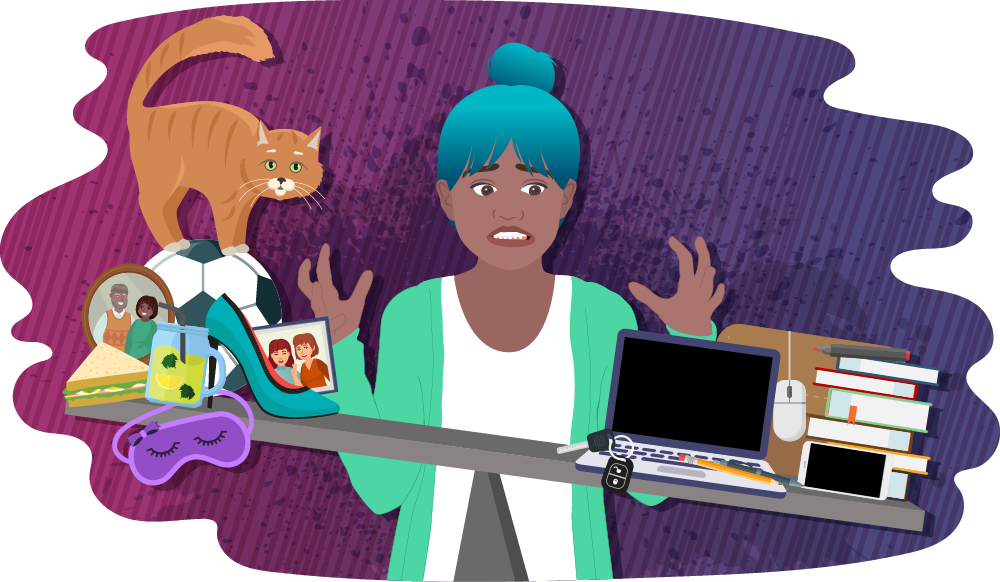Coping with burnout
It can be a balancing act to manage different areas of your ...
READ METo find a balance between work, study, and family/friends/fun, it can help to understand the history and different challenges of modern commitments.

Much has changed since modern working began. Women are now in the workforce, people are achieving higher levels of education, we live in a globalised world, the economy changes with each generation, and technology has drastically altered the way we work and live.
Our current ‘full time’ employment structure is based on the idea that our day is divided into three sections of eight hours each. You get eight hours for sleep, eight hours for work and eight hours for leisure.
But you may be finding that it doesn’t exactly work that way…
Having balance is about understanding your personal ‘sweet spot’ about whether you are working/studying too much or too little. (Everybody makes these judgments for themselves within reason, because we’ve all got bills to pay.) Doing too much can lead to burnout and anxiety. Doing too little can lead to boredom and even depression.
Our current system of working was established in the early 1900s. The Industrial Revolution resulted in a lot of worker exploitation, and as a result, people fought long and hard for workplace rights. This is where we got the ‘eight hour day’!
Further entitlements, like annual leave, sick leave, etc., were negotiated by unions throughout the last century. Part of this negotiation was based on the fact that true balance isn’t possible – sometimes, you just need an extended break from work and to engage in leisure 24/7. That’s where we get the concept of a ‘weekend’.
The other part of this negotiation was around productivity. Employees are happier, healthier and more productive with time away from work to engage in other pursuits.
By its nature, working puts limits on what you realistically can and can’t do. Because most people need a job in order to live, there are limits on what we can and can’t control.
For example if your workplace has a culture that everyone does unpaid overtime, it can be hard to swim against that current. People are understandably worried about ‘making waves’. But there may also be stipulations under the Fair Work Act that mean overtime actually should be tracked and compensated.
So, if you find yourself in a situation where you aren’t sure of your rights, or feel like your employer is crossing boundaries, here are some starting points.
Working shifts, especially unsociable hours, can make it harder to have the work/life balance you want. Shift work can reduce social connections and have multifaceted impacts on health and mental health (especially if it disrupts sleep cycles). Here are some things that can help:
Have a routine. Routines can help you meet your needs in a simple, no-fuss way.
Prioritise self-care. Getting this right can go a long way towards managing some of the effects of shift work.
Make the most of the good bits. Having a sleep-in while everyone else is starting work at 9am can definitely be a perk. Focus on and take advantage of not being at work during the day.
Take off the rose coloured glasses. It’s normal to think the ‘grass is greener on the other side’, but all work comes with good and bad bits. Working during normal business hours is no different. It’s important to have a balanced view.
However, this isn’t always easy and takes a lot of trial and error. What works for someone else may not necessarily work for you and that’s ok! Here are some tips to get you started:
Working and/or studying from home can make balance more complicated! You may not get the ‘mental break’ from switching off and going to a different location. Here are some things that might help:
Get organised. Being organised reduces stress, saves time and can make you more productive.
Problem-solve the bad bits. Make a list of the things you don’t like and get creative around how to solve them.
Make the most of the good bits. If you’re working from home, you may as well enjoy the perks! Lunch-time naps, and exercising instead of commuting, anyone?
Prepare for setbacks. Things are going to go wrong. Technology will fail, misunderstandings will happen. Having backup plans can help you use setbacks as a learning opportunity.
Have a routine. Our brain loves routines because they are safe and familiar and form habits. A habit requires less energy from our brain, which frees our mind up to do (and think about) other things. It can also help to have a post-work routine that allows you to put aside work and focus on your personal life again.
Take off the rose coloured glasses. It’s human nature to forget the bad stuff when you start to miss something. It’s normal and natural to miss aspects of in-office work, like having a coffee break with a work friend, or not having to do video meetings. But just remember there are negatives as well, so having a balanced view is important.
Coping with burnout
It can be a balancing act to manage different areas of your ...
READ MECoping strategies
If you are feeling stressed, anxious or just struggling to deal, there ...
READ MEExam Stress
Exam time can be challenging. While a bit of pressure can help ...
READ MEBeing assertive and setting boundaries
Dealing with friends, fights, fallouts and more? Here's our top tips for ...
READ METalking helps! We’re here for you.
No problem is too big or too small.
We're here 24 hours a day, 7 days a week